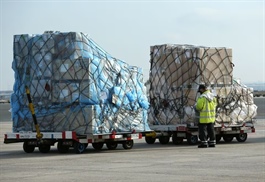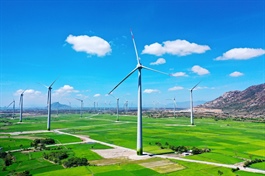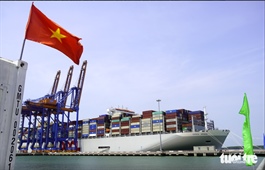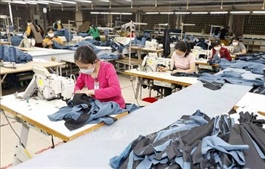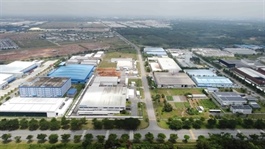Việt Nam's textile industry navigates trade agreement for Canadian market expansion
Việt Nam's textile industry navigates trade agreement for Canadian market expansion
Despite securing its position as the third-largest exporter of textiles and garments to the Canadian market, Việt Nam's garment and textile products still have ample opportunities to expand their footprint in the North American market.
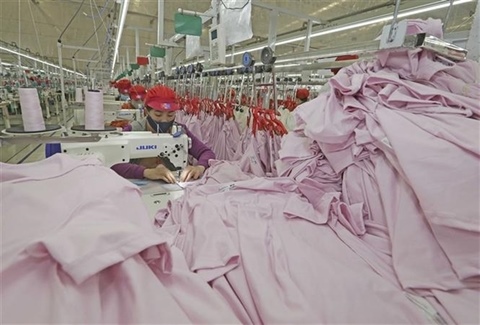
Garment production at Tinh Lợi Garment Company in Hải Dương Province. Việt Nam, currently among the top three global textile exporters, sees room for further economic integration and market expansion. — VNA/VNS Photo |
Currently, Việt Nam holds approximately a 12 per cent market share in Canada's imports of garment and textile products, a significant achievement attributed to increased attention to the origin of materials under the Comprehensive and Progressive Agreement for Trans-Pacific Partnership (CPTPP). However, to foster further development, the textile and garment industry in Việt Nam wants a bilateral agreement or a free trade agreement to reduce export taxes upon entering the Canadian market.
During a recent textile exhibition in Canada, two Vietnamese companies, Việt Nam Export Garment (VEG) and Thái Sơn Co, showcased their advantages by adhering to the origin principles under the CPTPP.
Trần Thu Quỳnh, Trade Counsellor at the Vietnamese Embassy in Canada, commenting on the event, said Việt Nam Export Garment (VEG) and Thái Sơn Company exemplify the capability to produce their own fibre materials. However, the utilisation rate of CPTPP through domestic material localisation is still at only about 50 per cent. The focus is now on guiding businesses to have a clearer direction in investment and logistics strategies within the connected chain of CPTPP countries to better exploit this agreement.
Nguyễn Quang Minh, Director of VEG, shared that in 2023, the company exported nearly US$10 million worth of goods to the US market.
This year, the company plans to establish additional branches in Canada, capitalising on favourable tax conditions provided by the government to encourage strong investments in the textile and garment industry.
Recognising Canada's potential market, VEG aims to connect with many partners by ensuring the origin of materials, product quality and competitive prices. The company has recently implemented a comprehensive investment strategy for reflective T-shirt products to supplement its range of protective workwear, aiming to expand in the North American market. Currently, the company has five branches across the United States and is finalising procedures to open a new location in Canada.
According to the latest data from the General Department of Việt Nam Customs, Việt Nam exported garment and textile products to Canada worth nearly $1.1 billion, which is a modest value compared to Canada's annual demand of $13-$15 billion. This is primarily attributed to the majority of domestic businesses not ensuring the origin of fibre materials according to CPTPP requirements.
Responding to questions from Việt Nam News Agency about opportunities for Việt Nam's textile and garment industry, Bob Kirke, President of the Canadian Apparel Federation, mentioned that there were still shortcomings in the CPTPP regulations on textiles, which were drafted when the United States was participating in the negotiations. Despite the absence of an opportunity to trade with the US, participating countries were still adhering to those rules.
To address this situation, Kirke suggested a free trade agreement between the two sides. After passing the CPTPP, Canada also simultaneously made agreements with Chile and New Zealand to eliminate the application of material origin principles. Among ASEAN countries, Canada currently has a similar agreement with Indonesia.
Kirke believes that the textile and garment industries of Việt Nam and Canada need to collaborate in proposing a thorough review of the agreement to the governments. According to him, a small change could benefit both sides, or they could consider a separate free trade agreement. Both approaches would help Việt Nam's textile and garment products become more competitive.
Việt Nam, currently among the top three global textile exporters, sees room for further economic integration and market expansion. Changing the origin principles is expected to provide new momentum for Việt Nam's textile and garment exports.
Việt Nam's textile and apparel exports reached $40.3 billion in 2023. With an ambitious target, Vietnam Textile and Apparel Association (VITAS) aims for a 9.2 per cent increase in total exports to reach $44 billion in 2024. The industry plans to shift towards sustainable development and circular business models by 2030, focusing on technology, human resources and eco-friendly practices.







